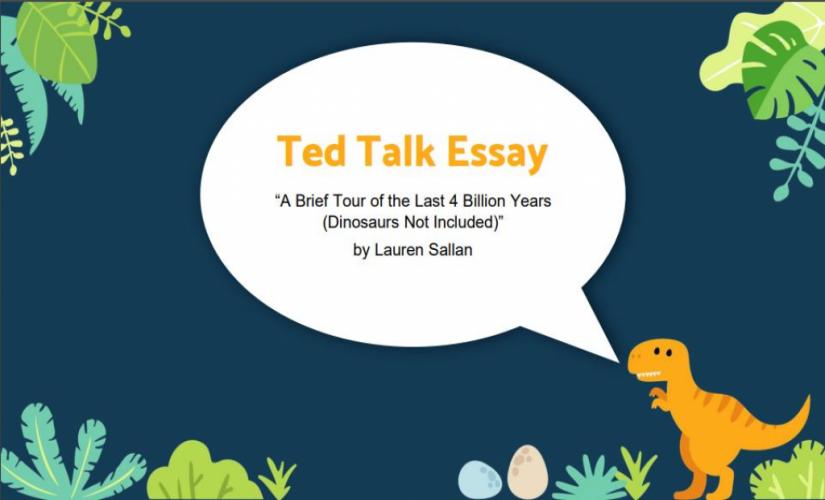Paleontology has always been loosely defined by tying it to the study of dinosaurs. As such, it has still been regarded as an aspect of science that explains the extinction of dinosaurs. Such definitions curtail the scope of the otherwise vast field of study. In this case, the Ted Talk essay on “A Brief Tour of the Last 4 Billion Years (Dinosaurs Not Included)” by Lauren Sallan helps to dissipate the misconceptions that people associate with paleontology. Hence, considering the main point of view of the video, its importance, and how it is relevant and applied to the real world come handy in understanding the whole concept of paleontology.
The Main Idea of Paleontology
Paleontology is grander and more extensive than is perceived through the dinosaur-based analogy. This concept covers the primary understanding presented by Sallan, and the speaker portrays paleontology as the study of the past life, which entails all forms of life, and not just the dinosaurs (00:00:33-00:00:40). Indeed, Sallan’s main point of view while taking the audience through a journey of life on earth without touching on dinosaurs is to lay bare the overall purpose of paleontology. Therefore, this idea helps expose the general presumption that paleontology is all about the extinction of dinosaurs.

Learning Paleontology
Then, there is so much to learn about paleontology. For example, the everyday conceptions of dinosaurs and climate change have taught people about the constant extinction process that will soon end life on earth (Allmon par. 3). In turn, people can learn these concepts from the movies and the books as well, making the concepts in the video relatable to real life. As such, the dinosaur stories help to create a desire to learn more about paleontology and extension, experience, and expectations beyond it.
Importance of Paleontological Studies
There is also an appreciation of the importance of data on the advancement of paleontological studies. For instance, the review of records helps to understand the past and make it possible to appreciate how evolution works (Sallan 00:07:40-00:07:50). In this case, the information about the study of past patterns through records can be applied to make predictions for the future. Indeed, paleontology cannot exist without fossil records. Basically, there is a constant indication of mass extinctions that are proceeded by life forms that are more refined and advanced than before (Sallan 00:06:34-00:06:40). The study of these life patterns is important in perceiving the future trends of the same. Hence, records and specific models help to understand the nature of life and the expectations that it creates for the current and future generations.
Paleontology and Evolution
Paleontology helps one to appreciate the concept of life through various periods, which is vital in understanding evolution and its consequences. For instance, an experience that started through simple genetic materials forming bacteria and viruses evolved and led to the formation of plants and animals that existed today (Huss 215). Each mass extinction was preceded with a significant evolutionary event, each leading to new and advanced life forms. Moreover, events such as the Cambrian explosion were important in the evolutionary track, leading to the existence of complex animals (Levinton 448). In turn, the memory of such life was preserved upon the mass extinction periods and was crucial in the emergence of better life forms afterward. With each regeneration after a mass extinction, it comes better knowledge on the complex concept of life.
Summing Up
In conclusion, the video is very informative, covering the concepts of paleontology that are often disregarded. It presents a fascinating view of life as a complex abstract that might live beyond contemporary life forms. This aspect supposes the possibility of the emergence of new adaptable life forms beyond the destruction and extinction through climate change. Such endless possibilities give one unique perspective on life and help one to appreciate life’s sanctity in general.
Works Cited
Allmon, Warren D. “Everything Is Paleontology.” Paleontology Research Institution, 2020, www.priweb.org/blog-post/everything-is-paleontology.
Huss, John. “Paleontology: Outrunning Time.” Time of Nature and the Nature of Time. Springer, Cham, 2017, pp. 211-235.
Levinton, Jeffrey S. Genetics, Paleontology, and Macroevolution. New York: Cambridge University Press, 2000.
Sallan, Lauren. “A Brief Tour of the Last 4 Billion Years (Dinosaurs Not Included).” TED, 2019, www.ted.com/talks/lauren_sallan_a_brief_tour_of_the_last_4_billion_years_dinosaurs_not_included.


